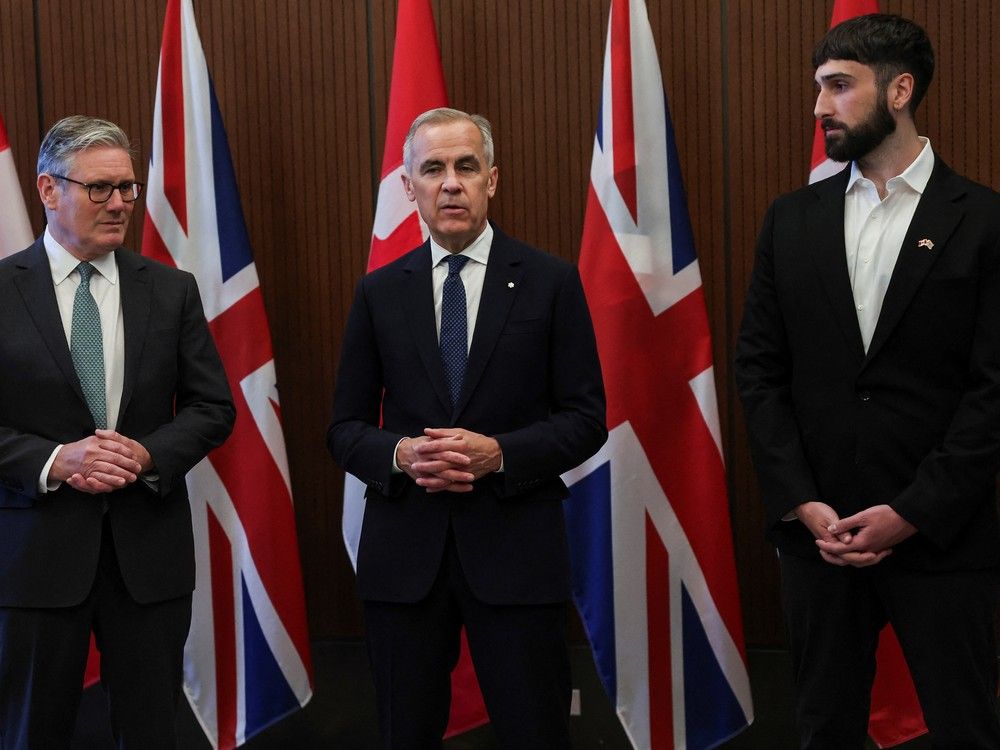The Government of Canada has partnered with Cohere, a Canadian AI firm, to accelerate the adoption of
artificial intelligence in the public service
.
In a joint statement published Sunday, Prime Minister Mark Carney said the federal government has signed memorandums of understanding (MOUs) with Cohere and the United Kingdom to “deepen and explore new collaborations on frontier AI systems to support our national security.”
The statement also said Cohere will build data centres across Canada and expand its presence in the U.K. to support the the country’s AI Opportunities Action Plan.
“The government of Canada has been working closely with Cohere, one of Canada’s — and one of the world’s — leading AI companies,” Carney said at a pooled press event Sunday with U.K. Prime Minister Keir Starmer.
“We’re absolutely thrilled that a partnership is developing between the United Kingdom and Cohere … The U.K.
— and
Canada, we like to say as well — have been one of the pioneers in not just AI development, but also the safety and security of the applications of AI, to really realize the full potential. And we’re deepening the collaboration between Canada’s AI Safety Institute and the new U.K. Security Institute, and this is going to help to realize the full potential for all our citizens.”
Aidan Gomez, Cohere’s CEO, said the company will work on accelerating the adoption of AI into the public sector. The CEO has been participating in discussions with Carney and Starmer, including promises to make government more productive and efficient, according to a company blog post.
“We’re super excited to be partnering with both governments … Cohere is excited to strengthen the innovation of both of our countries, as well as the sovereignty. Thank you for your partnership, and your support,” Gomez said at Sunday’s event.
Details still unclear
Gomez and Carney didn’t provide details on what the acceleration of AI use in the public sector would look like, however. The Ottawa Citizen sent an email to the prime minister’s office asking for more details about the partnership, but didn’t get a response in time for publication.
The federal government already uses AI in several ways,
but officials have previously said work is underway to expand its use. One of the main priorities includes training and building talent in AI use, but it’s still unclear whether this will disrupt public service jobs.
Sunday’s announcement also comes months after Carney
campaigned on AI use in the public sector
during the 2025 federal election, saying it is key to “unlocking productivity, higher paying jobs, and new prosperity that will benefit everyone.”
According to the Liberal party platform, AI can make the public service more efficient by reducing repetitive tasks workers have to do so they can focus on “valuable aspects” of their jobs.
The platform also includes a promise to use AI to address government backlogs and “improve service delivery times.”
The Liberal party also said this will allow Canadians to access better and faster services.
“The federal government has been spending too much. There are federal programs and processes that aren’t working as well as they should, and projects that need to be reviewed as we adjust to the priorities of this challenging moment.
“We need to be efficient and effective in all that we spend, while empowering a world-class, tech-enabled public service,” the platform reads.
Union criticizes partnership
The Public Service Alliance of Canada, the union that represents public service workers across Canada, urged Carney to consult with unions and workers about the use of AI in the public sector.
In an emailed statement to the Ottawa Citizen, the union said it will continue to negotiate with the federal Treasury Board to ensure that collective agreements are reflective of “rapidly changing workplace environments.”
“We’ve been very clear that artificial intelligence isn’t an excuse to cut public service jobs. AI is a valuable tool that can support public service workers, but it cannot replace them. Prime Minister Mark Carney’s government hasn’t been transparent about how the use of artificial intelligence will impact workers and the services Canada depends on, and we’re left with more questions than answers,” the statement read.
— With files from The Canadian Press
Our website is your destination for up-to-the-minute news, so make sure to bookmark our homepage and sign up for our newsletters so we can keep you informed.
Related
- Here’s what you can do in Ottawa with the Canada Strong Pass
- Is the public service doing enough to train new leaders?



